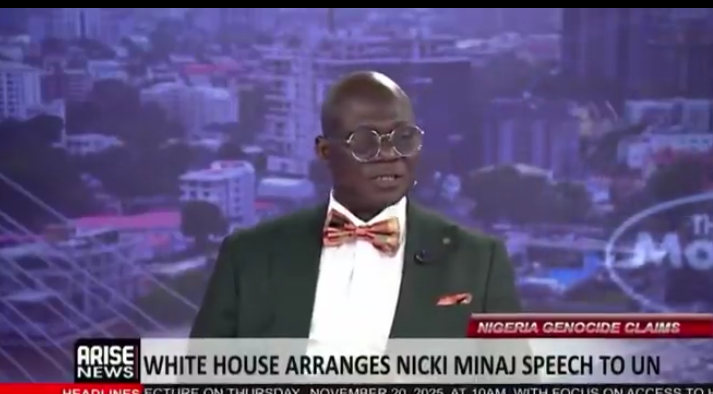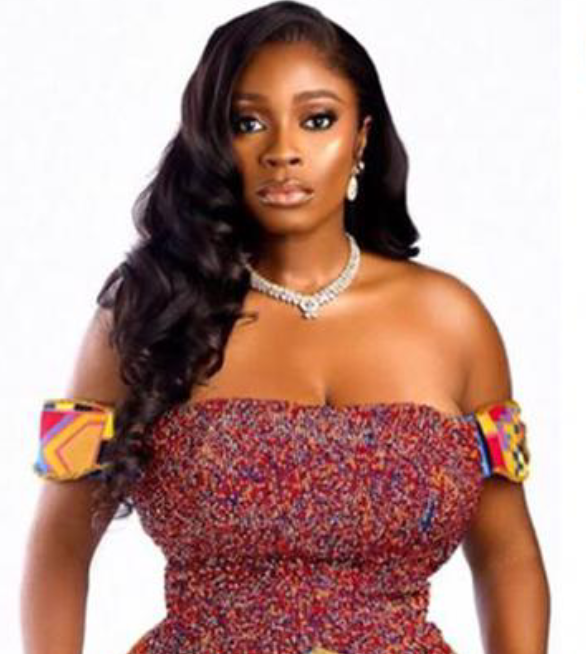
TIWA SAVAGE, NOT NICKI MINAJ: REUBEN ABATI SPARKS NATIONAL STORM AFTER BLASTING RAPPER’S UN SPEECH ON NIGERIA

The Nigerian social space erupted into a full-blown conversation after veteran journalist Reuben Abati boldly claimed that American rapper Nicki Minaj was “chasing clout” with her recent United Nations speech addressing what she described as an alleged Christian genocide in Nigeria. Abati did not stop there. In a statement that has since sparked heated debate across traditional and social media, he suggested that Nigeria should respond by sending global music icon Tiwa Savage to defend the country on national television. The comment, delivered with Abati’s trademark mix of provocation and political insight, has opened a new chapter in the ongoing international perception battle surrounding Nigeria’s internal conflicts, religious tensions, and the global narratives shaping them.
According to Abati, Nicki Minaj’s remarks at the UN were “misguided, sensational, and clearly designed to draw attention to herself rather than Nigeria’s realities.” The rapper, known for her bold persona, had taken the stage at a UN event to highlight what she called the “systematic slaughter of Christians in Nigeria,” referencing attacks in states like Plateau, Benue, and Southern Kaduna. While her emotional delivery earned applause from several Western human rights observers, it struck a nerve back home, especially among those who believe the international community often oversimplifies Nigeria’s complex security challenges. Abati, in his critique, argued that Nigeria’s internal issues should not be reduced to what he described as “celebrity-driven narratives that reinforce stereotypes for global consumption.”
His comments immediately divided Nigerians. Supporters of his viewpoint say he was right to push back against what they consider a misleading portrayal by a foreign celebrity with limited understanding of the country’s political, ethnic, and religious dynamics. Critics, however, insist that Abati’s dismissal misses the more important point—that violence, wherever it occurs, deserves global attention, even if delivered by an unlikely messenger. But the part of his statement that truly set social media on fire was the suggestion that Tiwa Savage should be the one to speak on Nigeria’s behalf in response.
The choice of Tiwa Savage, one of Africa’s biggest female music exports, was not random. Abati emphasized that Tiwa possesses not only global recognition but also a deep connection to Nigeria’s cultural identity, making her an ideal voice to counter what he sees as misrepresentations. In his words, “If Nigeria wants to respond on a global stage, we need someone who understands the heartbeat of the country, someone who represents us authentically. Tiwa Savage can do that better than Nicki Minaj ever could.” This statement, predictably, generated intense reactions. Some Nigerians found the idea amusing and rooted their comments in humor, suggesting they would love to see Tiwa Savage calmly addressing the UN in flawless English with her characteristic confidence. Others questioned the logic of pitting two female superstars against each other over a deeply sensitive national issue.
As the debate grew louder, questions began to surface about the role of celebrities in shaping narratives about serious political and humanitarian issues. Should artists comment on national conflicts? Should they be expected to take sides? And, perhaps more importantly, how does the world decide whose voice is credible? Nicki Minaj’s comments have now been placed in the long history of foreign celebrities stepping into African issues, sometimes with good intentions and other times in ways that complicate already delicate situations. Some Nigerians fear that her statement will reinforce negative stereotypes about Nigeria as a hotbed of religious violence, while others believe global attention might pressure authorities to act more decisively.
For Tiwa Savage, who has not yet publicly responded, the situation places her in an interesting position. Known for her artistry, elegance, and measured public persona, Tiwa has rarely been directly involved in political debates. Her involvement in global advocacy has usually been through women’s rights, cultural representation, and charity. Some wonder whether she would even accept such a responsibility were it ever formally proposed. Nonetheless, the idea floated by Abati has unexpectedly turned into a trending national discourse, with thousands debating whether a Nigerian entertainer should be the face of the country in moments of international scrutiny.
Meanwhile, supporters of Nicki Minaj argue that dismissing her comments as “clout chasing” overlooks the influence global celebrities wield. In a world where international politics increasingly intersects with entertainment, they argue that voices like Nicki’s—no matter how controversial—can draw attention to issues that governments prefer to downplay. For them, the question is not whether Nicki Minaj understands Nigeria perfectly, but whether the violence she referenced is real and demands global concern. They insist that criticising the messenger does not erase the underlying facts she brought to the fore.
Still, Abati’s claim that Nicki Minaj exploited Nigeria’s religious conflict for attention has resonated among a large subset of Nigerians weary of foreign commentary that they believe often paints the country in unfair light. Many Nigerians feel that Western celebrities rarely highlight positive aspects of the country but are quick to jump on narratives that portray Nigeria as chaotic or unstable. This sentiment has strengthened support for Abati’s call to elevate Nigerian voices, especially those with international influence, who can communicate the nuances of the country’s issues without reinforcing negative stereotypes.
The controversy has also expanded into political circles, with some commentators suggesting that the Nigerian government should issue an official response to clarify its position on the claims Nicki Minaj made. Others believe giving the matter more attention could escalate the issue unnecessarily, turning a celebrity remark into a diplomatic problem. What remains clear is that the debate has once again exposed the tension between Nigeria’s internal complexities and the simplified narratives that often circulate globally.
As the online firestorm continues, Tiwa Savage’s fans are rallying to her defense, urging Nigerians not to drag the singer into political crossfire she did not volunteer for. Many believe that turning Tiwa into a “national spokesperson” is unfair, unrealistic, and unnecessarily burdensome. Still, others see potential in Abati’s idea, arguing that Nigeria needs more global cultural ambassadors who can stand up confidently for the country on the world stage.
In the end, the controversy reveals as much about Nigeria’s internal anxieties as it does about Nicki Minaj’s unexpected foray into geopolitical commentary. It shows a nation deeply sensitive to how it is portrayed, fiercely protective of its identity, and unwilling to let a foreign celebrity dictate global narratives about its conflicts. Whether or not Tiwa Savage ever steps forward to respond, the debate sparked by Abati’s remarks will likely continue shaping conversations around global perception, celebrity influence, and national representation.
For now, Nigerians remain divided—some cheering Abati’s boldness, some siding with Nicki Minaj’s right to speak, and others simply shaking their heads at how a UN speech morphed into a cultural showdown between two music superstars. But if one thing is certain, it is that this moment has pushed the conversation about who gets to speak for Nigeria onto the world stage, and Nigerians are not taking it lightly.
“Nicki Minaj is chasing clout with her UN speech on alleged Christian g+nocide in Nigeria. Nigeria should have Tiwa Savage defend the country on national TV,” says Nigerian journalist Reuben Abatipic.twitter.com/QQ2Ff8qTna
— Instablog9ja (@instablog9ja) November 19, 2025


